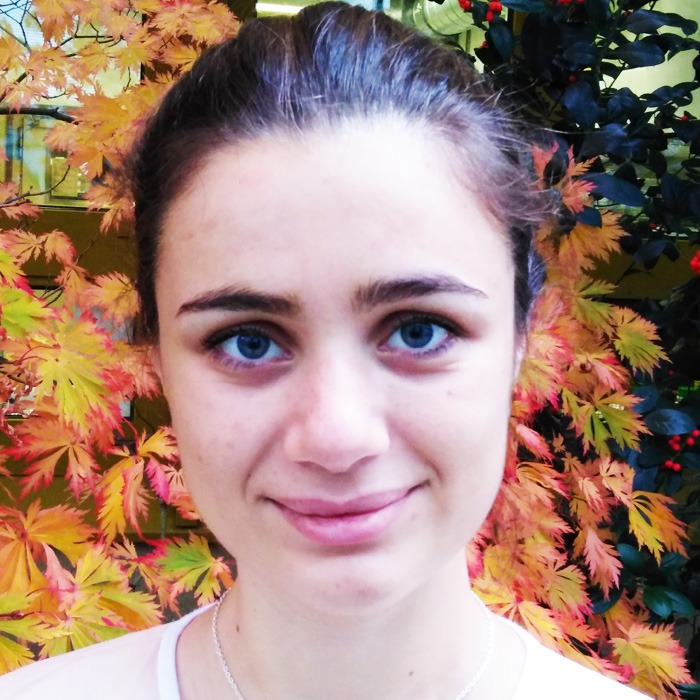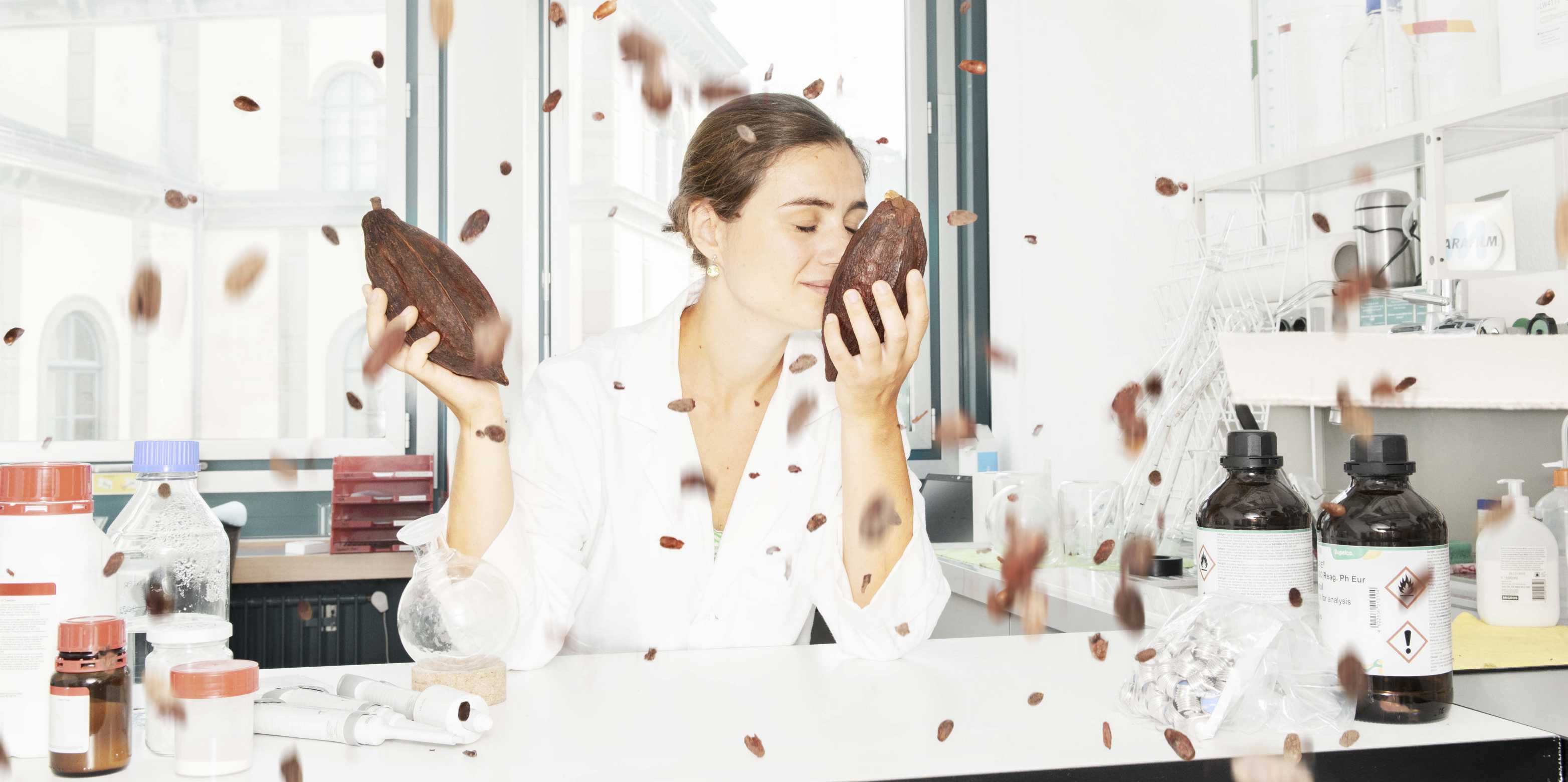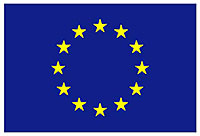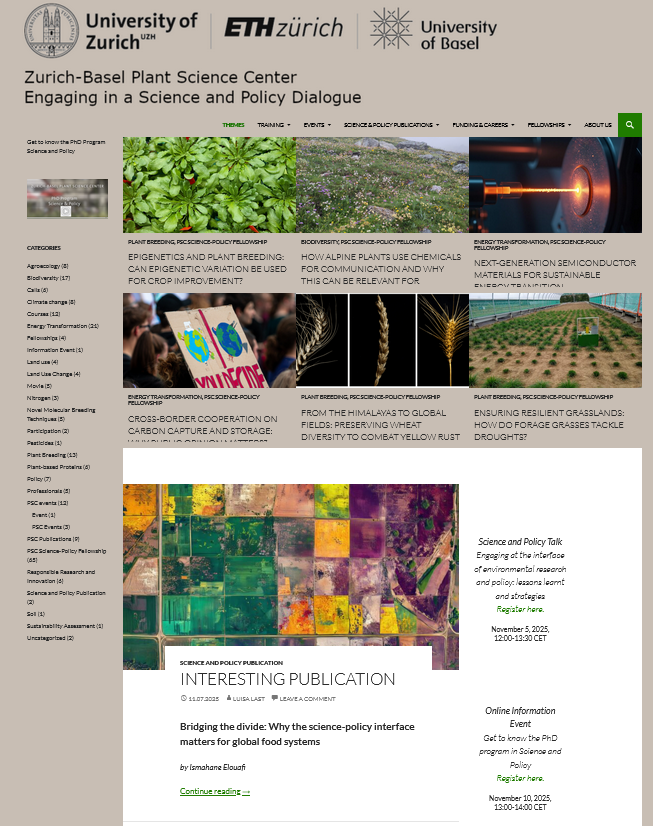Fermentation with Functional Co-cultures: A Metabolite Driven Approach to Improve Cocoa Bean Quality, Safety, and Sustainability

Fellowship Duration: Nov 2021 – Oct 2024
PhD Student: Julie Lestang (LinkedIn)
Principal Investigator: Prof. Laura Nyström, Professor of Food Biochemistry, Institute of Food, Nutrition and Health, Laboratory of Food Biochemistry, Department of Health Sciences and Technology, ETH Zurich, Switzerland
Project Partner: Food Biotechnology Research Group, Institute of Food and Beverage Innovation, ZHAW Zurich University of Applied Sciences, Wädenswil, Switzerland and Halba, Switzerland
Research Fields: Food Science, Food Biochemistry, Food Biotechnology
Project Description
The total world production of cocoa beans, the main ingredient of chocolate, was estimated at 5.2 million tons for the 2020-2021 season (ICCO, 2022). Fermentation is the first transformation step of cocoa beans into chocolate. This chemical process aims to remove the pulp around beans, develop chocolate color and flavor, and avoid seed germination. It involves a well-defined succession of microorganisms of yeasts, lactic acid bacteria, and acetic acid bacteria. Most cocoa fermentations are empirically run by farmers and occur thanks to the spontaneous inoculation of fresh cocoa beans by microorganisms from the environment. Consequently, the fermentation quality may remain inconsistent. Contamination of the beans by undesirable microorganisms are one of the main causes for low quality. For instance, filamentous fungi producing mycotoxins may contaminate cocoa beans during fermentation, drying, and storage. Accumulation of mycotoxins is a potential risk to human health. Together with our project partner ZHAW Food Biotechnology Research Group we aim to develop an innovative approach. We use rapid mass spectrometric analysis to facilitate the selection of microbial strains for functional fermentation cultures to produce cocoa with desirable characteristics, which typically takes several years. Our aim is to characterize the chemical profiles of cocoa beans fermented with co-cultures using rapid untargeted analyses, as well as targeted analyses of compounds affecting the anti-fungal activity and aroma composition. The correlation between the chemical profiles and beans’ quality will be explored to identify markers. The efficacy of the functional co-cultures and the innovative approach will be evaluated under real-life conditions during the secondment in Ecuador at UNOCACE, a cooperative of cocoa producers working in collaboration with Halba (partner). The secondment will also be the opportunity to demonstrate the use of fermentation co-culture in the cooperative.
This fellowship is hosted by the World Food System Center
Activities and Publications
Doctoral thesis (ongoing)
ETH News article on Cacao “fingerprints” for better chocolate (2023)
Conference poster at the 38th EFFoST International Conference 2024 (Brugge, Belgium, Nov 2024)
Conference poster at the International Symposium on Cocoa Research (Montpellier, France Dec 2022)
Conference poster at the ETH Food Day 2022 (Zürich, Switzerland, Nov 2022)
Dissemination: Raising awareness among local farmers on the use of fermentation co-culture to improve quality with representatives of 12 cooperatives (Ecuador, Feb - Mar 2023)
Dissemination: Demonstration of the use of the co-cultures (during the 2nd secondment) with cooperative members (responsible for fermentation and quality managers of the cooperative) (Milagro, Ecuador, Oct 2023)
Secondment
The first secondment aimed to get a better understanding of the local post-harvest practices applied in the cooperative and define the experiments of the second secondment. The 12 cooperatives were visited and surveyed on the post-harvest practices and the importance of the impact of fungi contamination on their production. The expectations of the Unión de Organizaciones Campesinas Cacaoteras (UNOCACE) regarding the project were further clarified and the second secondment experiments started to be defined by selecting the best location and practice for the on-farm application of functional co-culture.
The second secondment was dedicated to the experiment of application of fermentation with functional co-cultures. Fermentations were performed using a functional starter culture. The processes were monitored, and samples were collected for further analysis. The experiments were an opportunity to raise awareness of functional starter cultures, including a demonstration of the practice, which may facilitate the future adoption of the use.
Duration: Feb – Mar 2023 and Oct - Dec 2023
Stakeholder Workshop
The first stakeholder workshop titled Demonstration of Application of Fermentation Co-culture took place on October 28, 2023, in Cooperative 2 de Mayo, Ecuador. This workshop was organized to introduce cooperative members (i.e., representatives from the UNOCACE (Unión de Organizaciones Campesinas Cacaoteras) and 2 de Mayo cooperatives to the use of functional fermentation co-cultures in cocoa processing. The session aimed to enhance their understanding of cocoa quality, especially in terms of managing fungal contamination and improving fermentation techniques. During the workshop, Julie led a session on raising awareness about cocoa quality, emphasizing the risks of fungal contamination and the potential of fermentation co-cultures to address these issues. Julie demonstrated the practical application of fermentation co-cultures and engaged with participants through interactive discussions. Engaging with cocoa producers is vital for the success of my research. The workshop provided valuable insights into the realities of cocoa fermentation at the farm level, and it was a crucial step in gaining acceptance from farmers to conduct on-site research. It also offered a platform for knowledge exchange, helping me refine my approach based on their feedback. The demonstration of fermentation co-culture practices serves as a foundational step toward the eventual adoption of these methods once they become commercially available. The workshop helped bridge the gap between scientific research and practical implementation, aligning my project with the needs and expectations of the cocoa producers. This early engagement will aid in fostering trust and cooperation, facilitating future knowledge co-creation and collaboration.
The second stakeholder workshop titled 54th Meeting of the Innovation Group Cocoa & Chocolate took place on Feb 7, 2024, in Camille Bloch, Courtelary, Switzerland. This event brought together Swiss chocolate industry professionals and researchers to discuss cutting-edge innovations in the field. The event fostered collaboration and knowledge exchange between stakeholders in cocoa production and chocolate manufacturing (incl. Swiss chocolate industry representatives, researchers, and stakeholders focused on cocoa innovation). Julie gave a talk and led a Q&A session where she shared insights gained during my secondment. Her presentation focused on the application of functional fermentation co-culture under real-life conditions in Ecuador, along with monitoring the fermentation process to ensure quality and consistency. The event offered an invaluable opportunity to stay informed on the latest trends in Swiss cocoa and chocolate research and development. It was also a platform for sharing Julie’s research outcomes, which highlighted the challenges and opportunities of cocoa farming in tropical regions. Engaging with industry stakeholders helped align her research with the needs of the Swiss chocolate sector. By sharing insights on cocoa farming and innovative fermentation techniques, Julie helped raise awareness of the challenges faced by cocoa producers. This interaction supported future research directions and contributed to the potential adoption of new fermentation methods that enhance sustainability and product quality.


